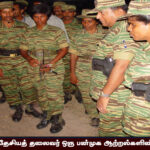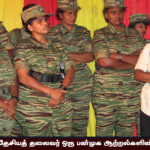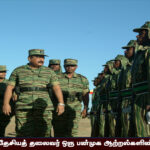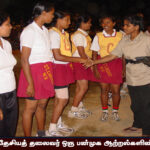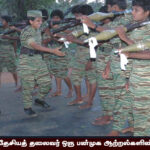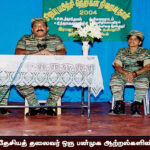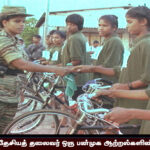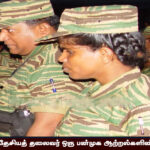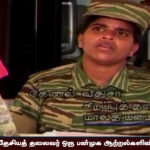

The national leader of Tamil Eelam, Honourable Velupillai Prabhakaran,
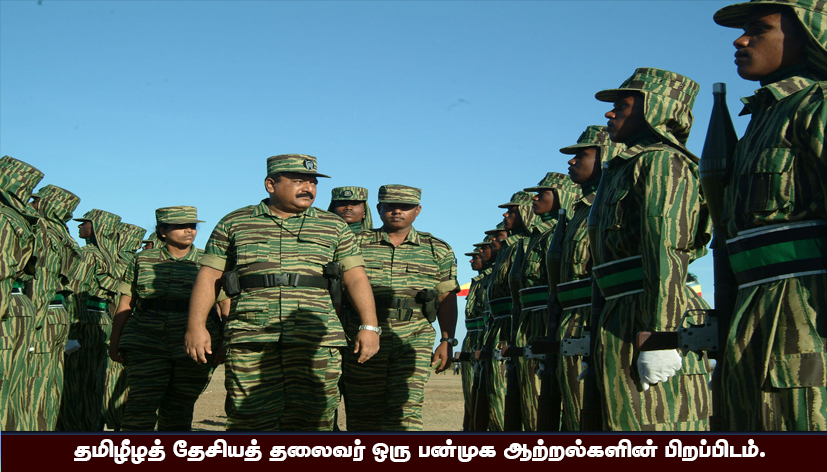
The national leader of Tamil Eelam, Honourable Velupillai Prabhakaran, is the birthplace of a multifaceted energy. He is an incomparable man who understood the sufferings of the Tamil people at a time when the Tamils were without peace, being killed and chased by the Sinhalese government. A wonderful hero who created a history of standing tall by giving the same guns in the hands of the Tamilians to change the tide from the aggressors that tried to suppress and destroy them. The polygonal potential within him is immeasurable. It cannot be expressed in ordinary words.
The bond the leader has with his fighters is deep. It never changed. For me, the life of the struggle near the leader started from the sand dunes when the Indian army invaded our land. From that day to this day, his compassion and concern towards the freedom fighters was like a father to his children despite being the leader of a nation. When we were in the sandy forest, if he heard the sound of coughing in someone’s hut at night, he would call the person in charge the very next morning and ask who was upset and arrange the corresponding medicine. Similarly, whatever problem is ours, it is his nature to understand and solve it as if it was his own.
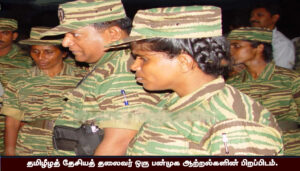 Thus understanding our problems correctly and not only as a leader, but the way he led us like the head of a family, even now we have established a close friendly relationship with him where we can open up and talk about any matter. He takes complete care that everything related to food and clothing provided to us should be excellent. Similarly, he had the characteristic of predicting many things in advance and telling us so that we do not have unnecessary losses in our areas in the battlefields. When we were standing in the forest, we had to go a long distance to get basic things like food and water.
Thus understanding our problems correctly and not only as a leader, but the way he led us like the head of a family, even now we have established a close friendly relationship with him where we can open up and talk about any matter. He takes complete care that everything related to food and clothing provided to us should be excellent. Similarly, he had the characteristic of predicting many things in advance and telling us so that we do not have unnecessary losses in our areas in the battlefields. When we were standing in the forest, we had to go a long distance to get basic things like food and water.
Every time before we leave, the leader will tell us all the things about our mission, how to go by which area, who should go first, and how to start an attack if the army is confronted. Thus, it can be said that the fighters who were with the leader in the sand forest did not suffer any unnecessary losses. In the same way, even now whenever I meet the leader, he asks if everyone is getting quality and delicious food and also pays attention to the availability of nutritious food, which is another example of his compassion.
Also, uniform was a big problem at that time. Understanding the problem, even in that military crisis, he arranged the clothes, sewed the vest and arranged the uniform himself. His compassion and dedication to the people was visible with these small gestures.
When the Tamil Eelam traitors were shooting and killing the parents of our fighters when the Indian Army was stationed on our soil, a district in-charge of our organization was furious and asked that what if we did the same instead. Hearing this, the leader got angry and said, “There is no use in killing those innocent parents. He told him to shoot the shooter back if possible”.
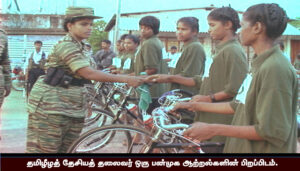 This became a lesson for everyone. An incident that happened during the Jayasikkuru military operations should also be mentioned here. When our teams were stationed at Puliangulam, I was walking along Mangulam road, a gentleman of a Tea Cafe stopped me and said, “My child, there is no proper income in this shop. We cannot solve this crisis to keep the shop running due to such low income. What can I do? I have written a letter to the Leader, will you deliver it to him?” He asked. I took and personally delivered his letter to the Leader. The leader immediately took appropriate action. Even in the crisis of the Jayasikkuru military operations, this action the Leader made to help this old gentlemen had raised my respect levels to heights I cannot fathom of him.
This became a lesson for everyone. An incident that happened during the Jayasikkuru military operations should also be mentioned here. When our teams were stationed at Puliangulam, I was walking along Mangulam road, a gentleman of a Tea Cafe stopped me and said, “My child, there is no proper income in this shop. We cannot solve this crisis to keep the shop running due to such low income. What can I do? I have written a letter to the Leader, will you deliver it to him?” He asked. I took and personally delivered his letter to the Leader. The leader immediately took appropriate action. Even in the crisis of the Jayasikkuru military operations, this action the Leader made to help this old gentlemen had raised my respect levels to heights I cannot fathom of him.
When we opened the border towards the peninsula, the first thing that our National Leader mentioned was the issue of people’s lives and property. People live densely in Jaffna, so when the army attack us by using people as a human shield, he advised us in advance that we should not attack the army with projectiles, but should go closer and attack with small arms. Even in such difficult situations, he was always mindful of every civilian that we fight to protect and witnessing that first hand was a different kind of sensation.
He would not allow us to be careless with anything like explosives, food, clothes by saying that everything we use is bought with people’s money. His anger can only be seen when he wastes such things that should be frugal. Another characteristic that we have seen in our leader is great planning, he thinks deeply about any subject, deals with each one accordingly, thinking ten steps ahead and assessing all possible possibilities.
Meticulous planning of every attack is proof that any battle takes place in the leader’s mind only after it has been staged on the field. To avoid problems that may arise during an attack, he stages the attack within the group as a training exercise, this was in his nature to preparing for it. During the year of 1990, our team set up guard posts in Palali area. At that time, there were teams and team leaders who did not have enough fighting experience.
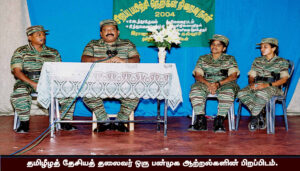 The threat from the soldiers was high and the distance between us and their army was small. We were frequently under attack by the army. Many of our fighters were engaged in guard duty with a cyanide capsule in their mouth. When the leader came to know this, he called me and said, “The weapon in the hand of the army is also in your hand, I did not send you there to die. If you continue to engage in duty in this way, pull back from the frontlines, talk with everyone in the team about this and take a decision.” He explained the nature of the area, the things favorable to the enemy there, and the countermeasures that we should take. As a result of the leader’s advice that day, after a few days, our team was able to launch an attack on the advancing army and capture their weapons.
The threat from the soldiers was high and the distance between us and their army was small. We were frequently under attack by the army. Many of our fighters were engaged in guard duty with a cyanide capsule in their mouth. When the leader came to know this, he called me and said, “The weapon in the hand of the army is also in your hand, I did not send you there to die. If you continue to engage in duty in this way, pull back from the frontlines, talk with everyone in the team about this and take a decision.” He explained the nature of the area, the things favorable to the enemy there, and the countermeasures that we should take. As a result of the leader’s advice that day, after a few days, our team was able to launch an attack on the advancing army and capture their weapons.
The leader had an eye to even see through the unique planning of the enemy in the breakthrough attack on the Jayasikkuru operation. This was a major coup attempt by the Sri Lankan Army. He moved our troops according to the location, time and movements of the enemy forces and responded to all the plans of the army destabilizing them entirely. The battle moved through every step with great confidence.
When we bring to his attention the issues that are difficult to solve, I’d be stunned when he gives a very simple and complete solution to it. When explaining the offensive plan of “Operation Unseizing Waves-3” to the commanders, he drew a line that a certain area should be captured. We could understand the peak of the planning when the leader unexpectedly reached the area he specified. Similarly, he had asked all the fighters involved in the training to drink more water before launching an operation on the Ariyalai area. It was only when we initiated the operation later that we were able to understand the hot climate of this particular area and the action taken by the leader in advance.
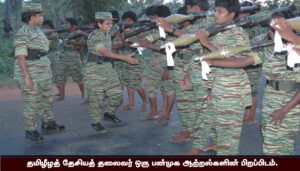 Before going on an attack, we would discuss immediate food needs on the field. If we requested chocolates, the leader would ask, ‘what kind of Chocolates do we need’. He’d ensure that it would be given and he would say if we were to eat it, we had to brush our teeth with a toothbrush. He gave me the duty of carrying the toothbrushes. His ability to think long-term and to pay attention to even the smallest things whilst planning and directing each attack meticulously, was simply amazing. The leader is someone who listens to anyone’s advice and opinion. One of the unique characteristics of a leader is to pay attention to constructive ideas, not to speed up liberation, but to bring about development in the nation, if they come from the fighters or the general public, to take care of it with importance, to immediately fullfill the important issues and to approach any issue from their own position and find a solution.
Before going on an attack, we would discuss immediate food needs on the field. If we requested chocolates, the leader would ask, ‘what kind of Chocolates do we need’. He’d ensure that it would be given and he would say if we were to eat it, we had to brush our teeth with a toothbrush. He gave me the duty of carrying the toothbrushes. His ability to think long-term and to pay attention to even the smallest things whilst planning and directing each attack meticulously, was simply amazing. The leader is someone who listens to anyone’s advice and opinion. One of the unique characteristics of a leader is to pay attention to constructive ideas, not to speed up liberation, but to bring about development in the nation, if they come from the fighters or the general public, to take care of it with importance, to immediately fullfill the important issues and to approach any issue from their own position and find a solution.
Similarly, when a soldier brought to his attention through a letter the issue of increasing monthly financial allowances for the families of those who stood in the field as frontier soldiers, he discussed the matter in more depth than we expected and instructed the concerned to immediately understand the issue and take action.
The leader, who understood the feelings of those who were engaged in training with great enthusiasm, took his time and talked to each brigade fighter individually and explained the justification and the welfare of the organization for changing their assignments. We were amazed that he took so much care for those fighters, regardless of his time. As far as the leader is concerned, he would pay full attention to select the best people for any task. He often said that when soldiers are appointed for any task, they should choose people who have the ability to think things through without doing what they are told, and who can find out the right and wrong in it and discuss and do it.
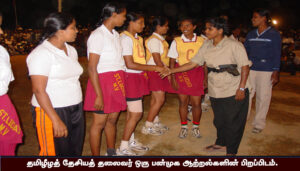 He ensured with any tasks assigned to us, we do not become complacent in the work we do. This trait of his was to make sure we do not become light hearted. Knowing that our soldiers fought well in the attack on the Sri Lankan Army in Koka in 1990, the leader expressed his appreciation. He looked at the wounds one of fighters had and said it was similar to that of the hero in Kalki’s novel Ponniyen Selvan’ who has sixty-four scars on his body. During the counter-operation of Jayasikkuru, when we were working on setting up advance guard posts in Puliangulam, the army made a great advance to our part with tanks. Our team defeated it and sent the Sri Lankan soldiers back with losses. The bravery he instilled in us made it clear at that time that there were more tasks to be done and challenges to be faced.
He ensured with any tasks assigned to us, we do not become complacent in the work we do. This trait of his was to make sure we do not become light hearted. Knowing that our soldiers fought well in the attack on the Sri Lankan Army in Koka in 1990, the leader expressed his appreciation. He looked at the wounds one of fighters had and said it was similar to that of the hero in Kalki’s novel Ponniyen Selvan’ who has sixty-four scars on his body. During the counter-operation of Jayasikkuru, when we were working on setting up advance guard posts in Puliangulam, the army made a great advance to our part with tanks. Our team defeated it and sent the Sri Lankan soldiers back with losses. The bravery he instilled in us made it clear at that time that there were more tasks to be done and challenges to be faced.
When the enemy was continuously attacking on many fronts, the lack of manpower was a big problem for us to face. The leader had come up with a plan to tackle this which he communicated with the commander who led this military operation. When the commander told us about this plan, it didn’t seem feasible. Then when I met the leader in person and he explained his plan to me in person, I then had good faith in the plan. We decided to do as the leader said. This plan the Leader came up with resolved the crisis with ease.
Similarly, when battle was held in all the fronts, our teams stationed in the forests faced a huge water problem. In these sorts of circumstances, we hesitate to ask the Leader for assistance on these matters, as they are so trivial. The leader came out and asked us directly if we are facing any difficulties to which we revealed this issue. Water Wells were immediately dug and arranged near the guards. Everyone was doing their own part in this struggle.
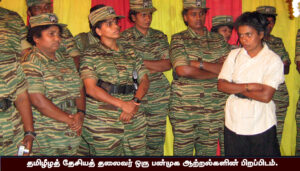 “My work for the race is not over yet. Only after I get the homeland for my people, I will be able to fulfill my mission completely”, he said. Thus his nature is not complete in his work. The chest of the leader who has been leading the struggle till now is immeasurable. It is that determination that has made our struggle so amazing to this day. It is appropriate to mention here an incident that happened when I was with the leader in Manalaaru forest during that period. It was a time when I faced great difficulties in meeting the basic needs like food and water.
“My work for the race is not over yet. Only after I get the homeland for my people, I will be able to fulfill my mission completely”, he said. Thus his nature is not complete in his work. The chest of the leader who has been leading the struggle till now is immeasurable. It is that determination that has made our struggle so amazing to this day. It is appropriate to mention here an incident that happened when I was with the leader in Manalaaru forest during that period. It was a time when I faced great difficulties in meeting the basic needs like food and water.
There was a time when direct communication between us and the people in the forest was blocked by the Indian Army. Army patrols were everywhere in the forest. A time when there is no such thing as a safe place to make plans, even for a leader. Understanding this situation, Colonel Kittu sent us a message from outside the jungle regarding the chief’s security advice and informed us that ‘I will not allow another surrender of arms for my life. If I die, another Prabhakaran or at least one Prabhakaran should appear and continue this struggle. You all have to make a firm decision on this. If anyone is not in the mood to cope with these hardships, I will safely hand them over to their parents. I will continue this struggle even if I have to kill animals to survive” he said.
When the leader said this, not one of the female fighters there had even grown to a junior officer. Through this incident, the leader could directly observe their idealism and faith in us. It was the determination and tenacious idealism of the leader that he would do anything for the country regardless of his own welfare or life that sent the Indian Army back from our soil and brought about a great change in history. Everyone should know what is the underlying desire of such a wonderful leader. One day after the recent treacherous incident, the leader expressed his feelings as follows. He expressed his wish that “If there is a better leadership to lead this struggle, he would like to leave this position and stand with the fighting teams as an ordinary fighter, go on a bicycle and serve among the villagers”.
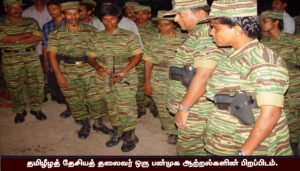 The above statement reminded me of what he had said in 1993 in a discussion regarding the welfare of injured freedom fighters, “After we win Tamil Eelam, my work will be completely dependent on the wounded members of LTTE and the progress of the affected people’. After being nurtured by a great man like this, growing up around this father like figure, how can we commit such crimes without respecting the egos of our heroes and people. The leader’s words, “Karma will punish them one day,” resembled the state of mind of our parents who guided us by saying, ‘Don’t sin’ when we made mistakes in our childhood. No matter how high he is, he is very simple in mind and action.
The above statement reminded me of what he had said in 1993 in a discussion regarding the welfare of injured freedom fighters, “After we win Tamil Eelam, my work will be completely dependent on the wounded members of LTTE and the progress of the affected people’. After being nurtured by a great man like this, growing up around this father like figure, how can we commit such crimes without respecting the egos of our heroes and people. The leader’s words, “Karma will punish them one day,” resembled the state of mind of our parents who guided us by saying, ‘Don’t sin’ when we made mistakes in our childhood. No matter how high he is, he is very simple in mind and action.
It is also pertinent to mention here an incident that took place in Unseizing Waves Battle-01. Our soldiers did not pay due respect to the bodies of the Sinhalese soldiers who died in the war and also burnt the Sri Lankan national flag. When this news reached the Leader’s ears, he condemned the matter. The national flag of a country is very sacred. If other countries burn the flag of our country, we get angry, so do the people of that country. Likewise, a different side of him was discernible by saying that we should give due respect to the body of a soldier.
I was already scheduled to meet the Leader coincidently on the day the news of Colonel Raju’s “Veerachavu” (A Hero’s Death) reached us. I nor my team had known of Raju’s death prior to the meeting but the Leader did. Unable to pronounce Raju’s name and to tell us the news directly, the Leader kept talking for a long time about Lt. Col. Victor and Lt. Col. Radha, whom Raju had known for a long time and stood together in the fields. I assumed that something had happened to our brother Col. Raju and then the leader told me the news directly of his death. His eyes were red and troubled. In the end he concluded that ‘Raju was very simple not only in his fighting life but also in his family life’.
Colonel Raju fell ill and was incapacitated for a certain period of time and was sent for treatment abroad after becoming very severe (diagnosed with Cancer). Knowing that he would only be alive for a few days, I could understand the pain in the leader’s heart when every commander and freedom fighter he loved suddenly embraced Veerachavu when I saw him struggling to calm himself due to the immense pressure placed on him.
During a fight with the Indian Army in the Manalaaru forest area, when a fighter named ‘Jeevan’ died, the leader got angry when the person in charge of the battle announced that Jeevan’s body could not be recovered. He immediately asked “Why couldn’t you retrieve it? If you cannot bring back his body, then I will go myself and retrieve him.” After hearing these words, they gathered the courage to go out themselves and retrieve Jeevan’s body.
Our leader is an example of immeasurable personality and at the same time simplicity, we are forever indebted to him. Apart from the great responsibility of being a national leader, his humanity, his compassion for the members of the LTTE and the people, is unmatched by anyone. If the leader who leads the liberation war with unparalleled perseverance and all the people unite behind him, continuing to add great strength, surely the ‘motherland dream’ of all of ours will come true.
“புலிகளின் தாகம் தமிழீழத் தாயகம்”
“Tigers’ yearn for the Tamil Eelam motherland”
Brigadier Vidusha / Distinguished Commander, 2nd Lt. Malathi Brigade, Liberation Tigers of Tamil Eelam.
